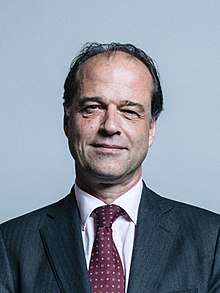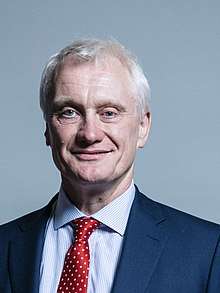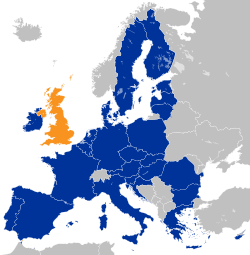Department for International Trade
 | |
| Department overview | |
|---|---|
| Formed | 14 July 2016 |
| Preceding department | |
| Jurisdiction | United Kingdom |
| Headquarters | 3 Whitehall Place, London, SW1A |
| Minister responsible | |
| Child agencies | |
| Website | Official website |
The Department for International Trade (DIT[1]) is a United Kingdom government department responsible for striking and extending trade agreements between the United Kingdom and non EU states (however the UK Government is not legally permitted to negotiate any trade deals with third party countries before it has exited the EU).[2] The department was created by Prime Minister Theresa May, shortly after she took office on 13 July 2016, following the United Kingdom's vote to leave the European Union.[3]
DIT's purpose is to develop, coordinate and deliver a new trade policy for the United Kingdom, including preparing for and then negotiating free trade agreements and market access deals with non-EU countries. The new department is a specialised body with significant new trade negotiating capacity.
It took on the responsibilities of UK Trade and Investment, which was previously operated by both the Foreign and Commonwealth Office and the Department for Business Innovation and Skills, it also took on the latter's other relevant trade functions; as well as responsibility for UK Export Finance.[4] It is overseen by the Secretary of State for International Trade, currently Liam Fox.[2]
As of February 2017, the department employs about 200 trade negotiators.[5]
Ministers
The Ministers in the Department for International Trade are as follows:[6]
| Minister | Rank | Portfolio | |
|---|---|---|---|
 |
The Rt Hon. Liam Fox MP | Secretary of State President of the Board of Trade |
Overall responsibility for all policies and sectors, both directly and through his ministers of state. He will personally lead on the defence and security sector and will be involved in the most significant global deals across all sectors. |
 |
George Hollingbery MP | Minister of State for Trade Policy | The Minister of State for Trade Policy has responsibility for the Trade Policy Group, which leads for the department on developing, coordinating and delivering a new trade policy. DIT is focused on delivering the best international trading framework to support UK prosperity and open trade. This includes: trading agreements and arrangements with other countries, UK engagement with the World Trade Organisation, ongoing EU trade business while the UK remains a member of the EU, trade remedies and establishment of the Trade Remedies Authority. |
 |
Baroness Fairhead of Yarm CBE | Minister for Trade and Export Promotion | The Minister for Trade and Export Promotion leads on the promotion of UK goods and services abroad including the financial arrangements that ensure UK-based companies succeed in the global economy. The minister’s work to support exports forms a key part of the government’s drive to increase productivity and growth across the country through the new Industrial Strategy. DIT ministerial lead for the following sectors: technology & smart cities, infrastructure, energy, healthcare and life sciences. |
 |
Graham Stuart MP | Minister for Investment | The Minister for Investment leads on investment promotion across all sectors. This includes: outward direct investment, foreign direct investment, delivery of trade and investment promotion through overseas partners, policy direction on topics such as mergers and acquisitions, the Export Control Joint Unit (ECJU) and business planning and forecasting. DIT ministerial lead for the following sectors: financial services, advanced manufacturing, aerospace, automotive, bio-economy, consumer, creative and education. |
See also
References
- ↑ "Department for International Trade". GOV.UK. GOV.UK. 28 July 2016. Retrieved 28 July 2016.
- 1 2 "About us - Department for International Trade". GOV.UK. Retrieved July 14, 2016.
- ↑ CSW and Politics Home staff (July 13, 2016). "Theresa May signals Whitehall rejig with two new Cabinet posts". Civil Service World. Retrieved July 14, 2016.
- ↑ "Machinery of Government Changes:Written statement - HCWS94". UK Parliament. July 18, 2016. Retrieved July 22, 2016.
- ↑ Trading places / Negotiating post-Brexit deals. Economist, February 4th-10th 2017, page 25
- ↑ "Full list of new ministerial and government appointments: July 2016". GOV.UK. Prime Minister's Office, 10 Downing Street. July 18, 2016. Retrieved July 24, 2016.
.svg.png)
